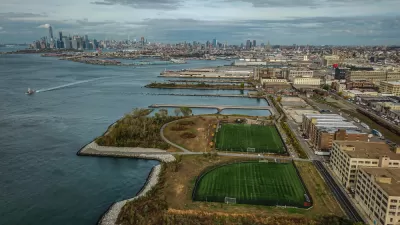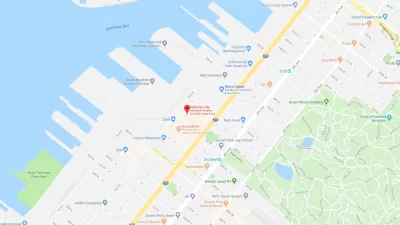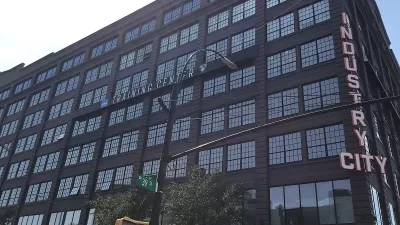Gentrification and displacement concerns won the day over a plan to rezone a former industrial area in Sunset Park, Brooklyn for new retail, offices, hotels and restaurants.

"Plans to rezone Industry City are, once again, dead on arrival — should the developer decide to move forward," reports Kathryn Brenzel from Brooklyn.
The grim reality for the project hit home after local councilmember Carlos Menchaca recently announced strong opposition to the project, proposed by developers Jamestown, Belvedere Capital, Cammeby’s International and Angelo, Gordon & Co.
The plan would have rezoned a 35-acre complex, which once housed heavy manufacturing, to expand its current capacity of retail, offices, hotels and restaurants. "Due to the coronavirus, the process has been halted since March and is expected to restart in September," according to Brenzel.
In New York City land use politics, the larger City Council usually acts in solidarity with a local councilmember's preference on project approvals to preserve each councilmember's own local veto power, according to Brenzel.
According to a separate article on the same subject by Karina Piser, "The outcome is the culmination of more than a decade of community organizing and lobbying by grassroots groups advocating for environmental justice and against gentrification. Chief among them are Uprose and Protect Sunset Park, which organized rallies, distributed petitions, coordinated community strikes, pressured Industry City executives directly, and hosted workshops and information sessions."
If you noticed a resemblance between this controversy and the defunct plan to welcome the second headquarters of Amazon to Long Island City in Queens, you wouldn't be the first.
The developers have yet to officially pull the rezoning application, and a project spokesperson quoted by Brenzel seems to indicate the developer's hope that "City Council Speaker Corey Johnson would negotiate a rezoning and marshall support from Menchaca’s colleagues to approve it."
FULL STORY: Industry City rezoning is effectively dead

Maui's Vacation Rental Debate Turns Ugly
Verbal attacks, misinformation campaigns and fistfights plague a high-stakes debate to convert thousands of vacation rentals into long-term housing.

Planetizen Federal Action Tracker
A weekly monitor of how Trump’s orders and actions are impacting planners and planning in America.

San Francisco Suspends Traffic Calming Amidst Record Deaths
Citing “a challenging fiscal landscape,” the city will cease the program on the heels of 42 traffic deaths, including 24 pedestrians.

Adaptive Reuse Will Create Housing in a Suburban Texas Strip Mall
A developer is reimagining a strip mall property as a mixed-use complex with housing and retail.

Study: Anti-Homelessness Laws Don’t Work
Research shows that punitive measures that criminalized unhoused people don’t help reduce homelessness.

In U.S., Urban Gondolas Face Uphill Battle
Cities in Latin America and Europe have embraced aerial transitways — AKA gondolas — as sustainable, convenient urban transport, especially in tricky geographies. American cities have yet to catch up.
Urban Design for Planners 1: Software Tools
This six-course series explores essential urban design concepts using open source software and equips planners with the tools they need to participate fully in the urban design process.
Planning for Universal Design
Learn the tools for implementing Universal Design in planning regulations.
Heyer Gruel & Associates PA
JM Goldson LLC
Custer County Colorado
City of Camden Redevelopment Agency
City of Astoria
Transportation Research & Education Center (TREC) at Portland State University
Jefferson Parish Government
Camden Redevelopment Agency
City of Claremont





























